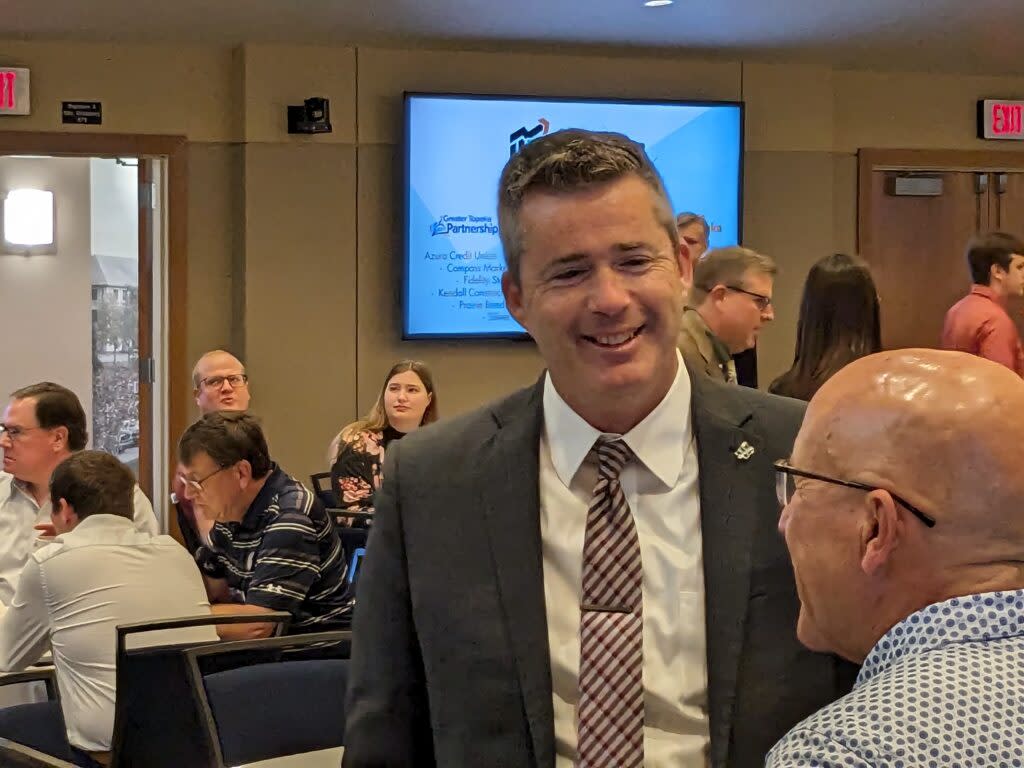Kansas analysts update revenue forecast ahead of Gov. Laura Kelly’s decision on tax, budget bills

- Oops!Something went wrong.Please try again later.
Kansas budget director Adam Proffitt said Gov. Laura Kelly would take revised state revenue forecasts, which he said were changed "very little" from the November projections, as she weighed a $1.5 billion, three-year tax reduction bill and considered details of a proposed new state budget. (Tim Carpenter/Kansas Reflector)
TOPEKA — Bills containing the new state government budget and a three-year, $1.5 billion tax reduction plan crafted by the Republican-led Kansas Legislature await action this week by Democratic Gov. Laura Kelly ahead of lawmakers’ return to the Capitol to close out the annual session.
Updated state tax revenue forecasts for the current and next fiscal years — a period covering 15 months ending in June 2025 — were based on a belief among analysts that Kansas economic and tax revenue trends warranted modest changes to projections issued in November. The state has a surplus of about $3 billion and the overall view of economists and others Friday was state revenue would grow 9.7% by close of the current fiscal year and that total revenue would expand 2.2% in the upcoming fiscal year.
That reflected the consensus view of economists and fiscal analysts that it was necessary to trim $100 million or 1% from the current year’s revenue forecast. For the fiscal year starting in July, the revised projection would add $146 million or 1.4% to the assessment released in November. In both fiscal years, state revenue would exceed $10.1 billion.
“With these estimates, there is a reoccurring theme,” said Shirley Morrow, acting director of the Kansas Legislative Research Department. “Everything is relatively stable at this point.”
Adam Proffitt, the state’s budget director, said the updated snapshot of state revenue would be a consideration as Kelly determined whether to sign House Bill 2036, which earned bipartisan support from legislators and would reduce state income, sales and property taxes. The latest tax-cut bill offered by the House and Senate would be assessed by Kelly in terms of the multi-year impact on state cash reserves and the necessity to avoid future deficits, he said.
“Ultimately, it’s her decision what to do,” Proffitt said. “She’s been consistent in wanting to make sure that revenue meets expenditures in the out years. We’ll see what that brings.”
The governor would take the revenue picture into consideration as she evaluated the Legislature’s mammoth state budget bill. She could accept or reject the budget entirely or modify it with targeted line-item vetoes. The House and Senate could try to override the governor after returning Thursday to the Capitol.
Kelly could likewise veto the tax bill, but House Speaker Dan Hawkins and Senate President Ty Masterson guaranteed an effort to override the governor. Republicans hold a supermajority in both chambers, meaning GOP lawmakers acting without assistance of Democrats could defeat a Kelly veto.
Under legislative rules, Kelly has until Thursday to act on HB 2036. The tax bill would create a two-tiered rate for state income taxes and drive down the upper rate from 5.7% to 5.5%. The Legislature’s attempt to push through a single-rate state income tax fell flat.
HB 2036 also would exempt Social Security benefits from state income taxes, increase the standard deduction for state income taxes, expand a child tax credit, exempt more residential property from the state’s tax for public schools and retire six months early the state’s 2% sales tax on groceries.
“We call on the governor to sign this tax bill,” Hawkins and Masterson said in a statement. “All Kansans are now just one signature away from relief from the budget of high property, income, Social Security and food sales taxes. Kansas has a burgeoning budget surplus and it’s time to deliver that money back to Kansas taxpayers where it belongs.”
The tax bill was approved by the House 119-0 and in the Senate 24-9. However, Senate Bill 28 containing the Legislature’s latest thinking on the state budget was sent to the governor with thinner majorities. The vote on SB 28 was 78-44 in the House and 26-12 in the Senate. The governor would have the same Thursday deadline to address the budget legislation.
Morrow, the acting director of the Legislature’s research division, said the state revenue report pointed to stability in the Kansas economy. She said possible risks included a surge in inflation, high interest rates, geopolitical pressure on commodity prices and declining agriculture industry income.
Kansas added 14,500 jobs from April 2023 to April 2024, she said, but the Kansas labor shortage remained. She said there were approximately two jobs for every available worker in Kansas.
The post Kansas analysts update revenue forecast ahead of Gov. Laura Kelly’s decision on tax, budget bills appeared first on Kansas Reflector.

